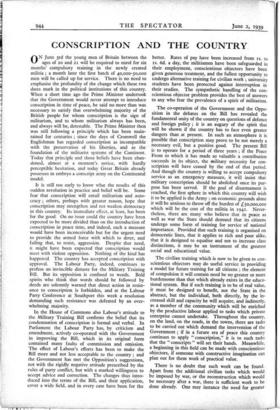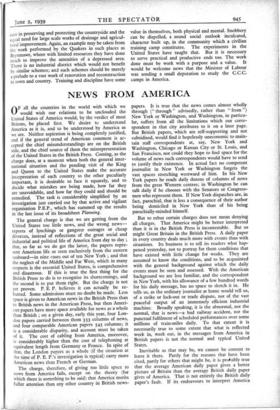CONSCRIPTION AND THE COUNTRY
ON June 3rd the young men of Britain between the ages of 20 and 21 will be required to enrol for six months' compulsory training in the newly created militia ; a month later the first batch of 40,000-50,000 men will be called up for service. There is no need to emphasise the profundity of the change which these two dates mark in the political institutions of this country. When a short time ago the Prime Minister undertook that the Government would never attempt to introduce conscription in time of peace, he said no more than was necessary to satisfy that overwhelming majority of the British people for whom conscription is the sign of militarism, and to whom militarism always has been, and always will be, detestable. The Prime Minister then was still following a principle which has been main- tained for centuries ; since the days of Cromwell the Englishman has regarded conscription as incompatible with the preservation of his liberties, and as the foundation of the militarist systems of the Continent. Today that principle and those beliefs have been aban- doned, almost at a moment's notice, with hardly perceptible hesitation, and today Great Britain already possesses in embryo a conscript army on the Continental model.
It is still too early to know what the results of this sudden revolution in practice and belief will be. Some fear that conscription will entail militarism and auto- cracy ; others, perhaps with greater reason, hope that conscription may strengthen and not weaken democracy in this country. Its immediate effect, at least, has been for the good. On no issue could the country have b.en expected to be more divided than on the introduction of conscription in peace time, and indeed, such a measure would have been inconceivable but for the urgent need to provide the armed force with which to deter, and failing that, to resist, aggression. Despite that need, it might have been expected that conscription would meet with violent opposition. Nothing of the kind has happened. The country has accepted conscription with approval. The Labour Party, indeed, continues to profess an invincible distaste for the Military Training Bill. But its opposition is confined to words. Bold spirits who think that words should be followed by deeds are solemnly warned that direct action in resist- ance to conscription is forbidden, and at the Labour Party Conference at Southport this week a resolution demanding such resistance was defeated by an over- whelming majority.
In the House of Commons also Labour's attitude to the Military Training Bill confirms the belief that its condemnation of conscription is formal and verbal. In Parliament the Labour Party has, by criticism and amendment, actively co-operated with the Government in improving the Bill, which in its original form contained many faults of commission and omission. The effect of Labour's efforts has been to make the Bill more and not less acceptable to the country ; and the Government has met the Opposition's suggestions, not with the rigidly negative attitude prescribed by the rules of party conflict, but with a marked willingness to accept advice and correction. The changes thus intro- duced into the terms of the Bill, and their application, cover a wide field, and in every case have been for the better. Rates of pay have been increased from is. to is. 6d. a day, the militiamen have been safeguarded in their employment, conscientious objectors have been given generous treatment, and the fullest opportunity to undergo alternative training for civilian work ; university students have been protected against interruption in their studies. The sympathetic handling of the con- scientious objector problem provides the best of answers to any who fear the prevalence of a spirit of militarism.
The co-operation of the Government and the Oppo- sition in the debates on the Bill has revealed the fundamental unity of the country on questions of defence and foreign policy ; it is an augury of the spirit that will be shown if the country has to face even greater dangers than at present. In such an atmosphere it is possible that conscription may prove to be not merely a necessary evil, but a positive good. The present Bill is to operate for a period of three years ; if the Peace Front to which it has made so valuable a contribution succeeds in its object, the military necessity for con- scription will have ceased by the end of that period. And though the country is willing to accept compulsory service as an emergency measure, it will insist that military conscription should be abolished once its pur- pose has been served. If the goal of disarmament is reached, the first sphere in which this country will wish it to be applied is the Army ; on economic grounds alone it will be anxious to throw off the burden of £50,000,000 which will be the cost of the militia in 1941. Never- theless, there are many who believe that in peace as well as war the State should demand that its citizens undergo some form of training for service of national importance. Provided that such training is organised on democratic lines, that it applies to rich and poor alike, that it is designed to equalise and not to increase class distinctions, it may be an instrument of the greatest social and educational value.
The civilian training which is now to be given to con- scientious objectors may do useful service in providing a model for future training for all citizens ; the element of compulsion it will contain need be no greater or more burdensome than that which already exists in the educa- tional system. But if such training is to be of real value, it must be designed to benefit, not the State in the abstract, but the individual, both directly, by the in- creased skill and capacity he will acquire, and indirectly, as a member of the community which will be enriched by the productive labour applied to tasks which private enterprise cannot undertake. Throughout the country, on the land, on the roads, in the towns, there are tasks to be carried out which demand the intervention of the Government ; if in a future era of peace this country continues to apply " conscription," it is to such tasks that the " conscripts " will set their hands. Meanwhile, a beginning in this field can be made with conscientious objectors, if someone with constructive imagination can plan out for them work of practical value.
There is no doubt that such work can be found. Apart from the additional civilian tasks which would be imposed by war, or the reconstruction which would be necessary after a war, there is sufficient work to be done already. One may instance the need for greater care in preserving and protecting the countryside and the equal need for large scale works of drainage and agricul- tural improvement. Again, an example may be taken from the work performed by the Quakers in such places as Brynmawr, where with limited resources they have done much to improve the amenities of a depressed area. There is no industrial district which would not benefit by similar schemes; and such schemes should be merely a prelude to a vast work of renovation and reconstruction in town and country. Training and discipline have some value in themselves, both physical and mental. Snobbery can be dispelled, a sound social outlook inculcated, character built up, in the community which a civilian training camp constitutes. The experiments in the United States have taught that. But it is necessary to serve practical and productive ends too. The work done must be work with a purpose and a value. It would be welcome news that the Minister of Labour was sending a small deputation to study the C.C.C. camps in America.











































 Previous page
Previous page